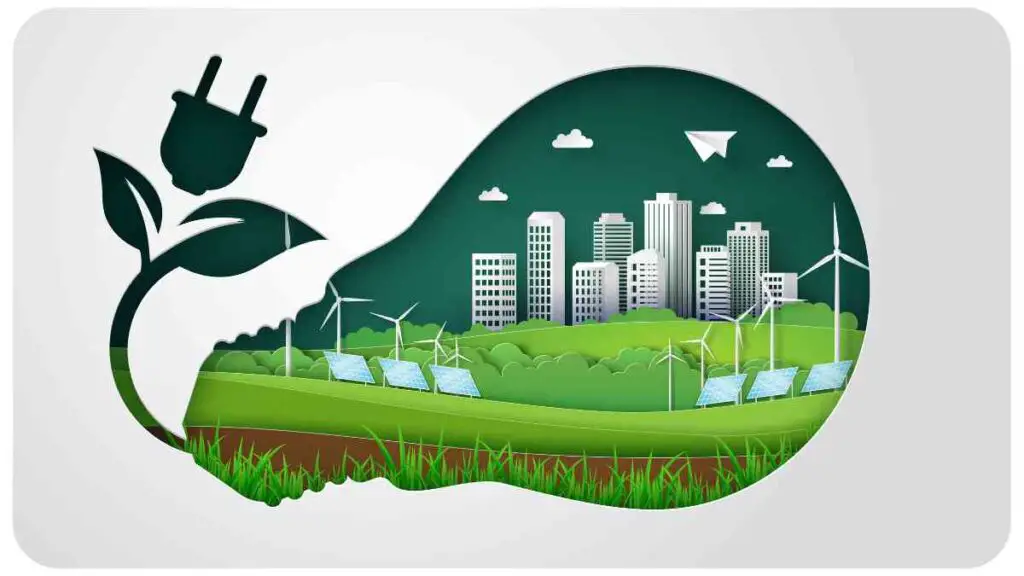Welcome to a comprehensive exploration of whether going vegan helps the environment. In this article, we will delve into the sustainability aspect of adopting a vegan lifestyle and the potential benefits it brings for our planet.
By embracing veganism, individuals have the opportunity to positively impact the environment through reduced resource consumption, decreased greenhouse gas emissions, and preservation of biodiversity. Let’s dive deeper into the topic and uncover the role of veganism in environmental conservation.
| Takeaway |
|---|
| Adopting a vegan diet can have significant environmental benefits, including reducing greenhouse gas emissions, water consumption, and deforestation. |
| Embracing plant-based alternatives can help minimize pollution, alleviate water scarcity, and protect biodiversity. |
| Shifting towards sustainable and eco-friendly farming practices can promote soil health, biodiversity, and environmental resilience. |
| Individual choices, such as opting for plant-based meals, reducing food waste, and supporting sustainable businesses, can make a positive impact on the environment. |
| By embracing veganism, individuals can simultaneously advocate for animal welfare and contribute to environmental conservation. |
2. What is Veganism?
Veganism is a lifestyle that abstains from consuming and using animal-derived products. It goes beyond diet and extends to the rejection of items like leather, fur, and other animal-based materials. People adopt veganism for various reasons, including health benefits, ethical concerns for animal welfare, and now, increasingly, to mitigate the environmental impact of their choices.
“Vegan diets significantly reduce environmental impact, and even the skeptics will be shocked!” states the article The Environmental Impact of a Vegan Diet – You’ll Be Shocked!. It analyzes the various ways in which choosing a vegan lifestyle can benefit the environment.
3. The Environmental Impact of Animal Agriculture
Animal agriculture is a significant contributor to environmental degradation. The production of meat and other animal products requires vast amounts of resources, including water, land, and feed.
Additionally, the livestock industry is responsible for significant greenhouse gas emissions, deforestation, water pollution, and habitat destruction. By understanding the environmental consequences of animal agriculture, we can better appreciate the potential sustainability benefits of veganism.
4. The Benefits of Going Vegan for the Environment

Reduced Carbon Footprint
The meat and dairy industry contribute significantly to greenhouse gas emissions, particularly methane and nitrous oxide. Methane, released by livestock digestion and manure, is a potent greenhouse gas with a warming effect far greater than carbon dioxide.
By reducing or eliminating animal product consumption, we can decrease our carbon footprint and mitigate climate change.
In the comprehensive guide titled The Ultimate Guide to Living a Sustainable Vegan Lifestyle, you’ll find valuable tips and strategies. Discover practical steps to incorporate sustainability into your vegan journey, from food choices to eco-friendly practices.
Table 1: Carbon Footprint Comparison
| Food Item | Carbon Footprint per kg (CO2e) |
| Beef | 13.3 |
| Lamb | 12.4 |
| Cheese | 8.5 |
| Chicken | 6.9 |
| Pork | 6.1 |
| Eggs | 4.8 |
| Plant-based Protein | 0.8 |
Conservation of Water Resources
Animal agriculture is water-intensive, requiring vast amounts of water for raising livestock and growing animal feed. By adopting a vegan lifestyle, individuals can significantly reduce their water footprint and help safeguard this valuable resource.
Table 2: Water Footprint Comparison
| Food Item | Water Footprint per kg (liters) |
| Beef | 15,415 |
| Pork | 5,988 |
| Chicken | 4,325 |
| Soybeans | 1,650 |
| Oats | 290 |
| Wheat | 660 |
Preservation of Land and Habitats
Animal agriculture requires large areas of land for grazing and cultivating feed crops. This leads to deforestation and habitat destruction, which threatens biodiversity and contributes to climate change. Choosing plant-based alternatives can help preserve valuable ecosystems and protect the habitats of endangered species.
Table 3: Land Use Comparison
| Food Item | Land Use per kg (m²) |
| Beef | 36 |
| Pork | 13 |
| Chicken | 6 |
| Rice | 4 |
| Wheat | 0.5 |
Mitigation of Deforestation

Agricultural expansion, including the expansion of animal agriculture, is a significant driver of deforestation worldwide. This destruction of forests not only leads to the loss of biodiversity and carbon sinks but also contributes to climate change. By opting for plant-based alternatives, we can reduce the demand for animal products and help mitigate deforestation.
The article The Power of Education – How to Effectively Educate Others on Veganism emphasizes the importance of spreading awareness. Learn how to educate others about veganism and inspire them to make sustainable and compassionate choices.
Table 4: Deforestation Comparison
| Food Item | Deforestation per kg (m²) |
| Beef | 52 |
| Pork | 12 |
| Chicken | 7 |
| Soybeans | 1 |
| Lentils | 0.5 |
Minimization of Pollution
Animal agriculture is a significant source of pollution, with the runoff from livestock farms leading to water contamination and the emission of harmful substances such as ammonia and hydrogen sulfide. By adopting a vegan lifestyle, we can contribute to reducing pollution and protecting both human and environmental health.
Alleviation of Water Scarcity
The agricultural sector is a significant consumer of freshwater resources, and intensive animal farming contributes to water scarcity in many regions. By shifting towards plant-based diets, we can effectively reduce the strain on water resources and help alleviate water scarcity-related issues.
Reduction of Greenhouse Gas Emissions
Livestock production is a major contributor to greenhouse gas emissions, accounting for a significant portion of global emissions. By reducing our consumption of animal products, we can contribute to the reduction of greenhouse gas emissions and combat climate change.
Decreased Energy Consumption

Animal agriculture requires substantial energy inputs for activities such as animal feed production, transportation, and processing. Shifting towards plant-based diets can lead to reduced energy consumption and contribute to a more sustainable and energy-efficient food system.
Explore the article Why Veganism Is the Future of Food to grasp the significance of plant-based diets. It delves into the reasons why embracing veganism is crucial for the future of food sustainability and global well-being.
Protection of Biodiversity
The expansion of animal agriculture often comes at the expense of natural habitats, leading to the loss of biodiversity. By embracing veganism, we can contribute to the protection of biodiversity, allowing ecosystems to thrive and preserving the delicate balance of our planet.
5. Veganism and its Ripple Effects on Resource Consumption
By adopting a vegan lifestyle, we not only directly reduce our own environmental impact but also influence resource consumption more broadly. As the demand for plant-based products grows, the agricultural industry will be incentivized to shift towards more sustainable and eco-friendly practices.
This, in turn, can benefit the environment by reducing the overall resource consumption associated with food production.
6. Assessing the Sustainability of Vegan Alternatives
When considering vegan alternatives, it’s crucial to assess their sustainability and environmental impact. Let’s explore different food categories and the sustainability considerations associated with them.
Plant-Based Diets
Plant-based diets consist of fruits, vegetables, legumes, grains, nuts, and seeds. These diets have a lower environmental impact compared to diets centered around animal products. By focusing on a varied and nutritionally balanced plant-based diet, individuals can enjoy a sustainable and ethical way of eating.
Table 5: Nutrient Comparison of Plant-Based Protein Sources
| Food Item | Protein Content (per 100g) | Iron Content (per 100g) | Calcium Content (per 100g) |
| Tofu | 8.1g | 5.4mg | 350mg |
| Lentils | 9g | 3.3mg | 36mg |
| Quinoa | 4.4g | 1.5mg | 17mg |
| Chickpeas | 19g | 6.2mg | 49mg |
| Almonds | 21g | 3.7mg | 264mg |
Synthetic Meat Substitutes
Synthetic meat substitutes, also known as plant-based meat alternatives, offer a more sustainable and cruelty-free option for those seeking to reduce their meat consumption. These products aim to replicate the texture, taste, and appearance of animal-based meat, providing a familiar experience while minimizing the environmental impact.
Have you ever wondered what’s in your vegan wine? Learn about the basics of vegan wine production with the article What’s in Your Vegan Wine? Understanding the Basics. Discover the process and ingredients behind vegan-friendly wine options.
Table 6: Environmental Impact Comparison of Synthetic Meat and Animal-Based Meat
| Food Item | Water Usage (per kg) | Land Usage (per kg) | Greenhouse Gas Emissions (per kg) |
| Beef | 15,415 liters | 36 square meters | 26.5 kg CO2e |
| Synthetic Meat | 1,100 liters | 5.5 square meters | 4.5 kg CO2e |
Dairy Alternatives

Dairy alternatives, such as plant-based milk, cheese, and yogurt, provide a sustainable and ethical alternative to traditional dairy products.
By opting for these plant-based alternatives, individuals can significantly reduce their carbon footprint, water consumption, and the overall environmental impact associated with the dairy industry.
Table 7: Environmental Impact Comparison of Dairy Milk and Plant-Based Milk
| Milk Type | Water Usage (per liter) | Greenhouse Gas Emissions (per liter) |
| Dairy Milk | 628 liters | 1.9 kg CO2e |
| Soy Milk | 28 liters | 0.7 kg CO2e |
| Almond Milk | 74 liters | 0.7 kg CO2e |
| Oat Milk | 48 liters | 0.4 kg CO2e |
| Coconut Milk | 387 liters | 0.9 kg CO2e |
Sustainable Seafood Options
For those who incorporate seafood into their diet, it’s essential to consider sustainable options. Overfishing and destructive fishing practices can harm marine ecosystems and deplete fish populations. By opting for sustainably sourced seafood or plant-based alternatives, individuals can reduce their impact on ocean health.
Table 8: Sustainable Seafood Options
| Fish Species | Sustainability Rating | Omega-3 Fatty Acids (per 100g) | Mercury Content (per 100g) |
| Sardines | Best Choice | 2.2g | Low |
| Wild-caught Salmon | Good Alternative | 2.6g | Low |
| Farmed Tilapia | Proceed with Caution | 0.1g | Low |
| Plant-Based Fish | Excellent | Varies | None |
7. The Role of Agriculture in Sustainable Development
Agriculture plays a crucial role in sustainable development. By transitioning towards more sustainable farming practices, such as organic farming, regenerative agriculture, and permaculture, we can promote soil health, biodiversity, and environmental resilience. Supporting local and sustainable agriculture initiatives can contribute to a more sustainable food system and help mitigate the environmental impact of our dietary choices.
8. The Influence of Personal Choices on Environmental Conservation
Individual choices have a profound impact on environmental conservation. By consciously opting for eco-friendly and sustainable options, we can contribute to a more sustainable future. Choosing vegan alternatives, reducing food waste, supporting local and organic farming, and minimizing single-use plastics are just a few examples of how our everyday choices can make a difference.
9. The Intersection of Animal Welfare and Environmentalism
Veganism and environmentalism often intersect with the common goal of promoting sustainability and respecting the well-being of all beings on the planet. By adopting a vegan lifestyle, individuals can simultaneously advocate for animal welfare and contribute to environmental conservation. This alignment showcases how our choices can have a broader impact beyond our immediate surroundings.
10. Overcoming Challenges and Making Sustainable Choices
Transitioning to a vegan lifestyle and making sustainable choices may come with certain challenges. However, with the right support, resources, and information, it becomes easier to navigate this path. Here are some key considerations:
Access to Sustainable Options
Availability of sustainable and plant-based alternatives may vary depending on geographical location. However, increasing demand and market interests are driving the availability of vegan products. Exploring local farmers’ markets, co-ops, and specialty stores can be helpful in sourcing sustainable options.
Importance of Labeling and Certification
Look for eco-labels and third-party certifications, such as organic and fair-trade certifications, when purchasing food products. These labels ensure that the products meet specific sustainability and ethical standards.
Community and Policy Support
Engaging with like-minded individuals through vegan and environmental communities can provide valuable support and resources. Additionally, supporting policies that promote sustainable practices and initiatives can create a more conducive environment for making sustainable choices.
11. Tips for Transitioning to a Vegan Lifestyle
Transitioning to a vegan lifestyle is a personal journey that can be approached in various ways. Here are some tips to help ease the transition:
- Start gradually by incorporating more plant-based meals into your diet and reducing the consumption of animal products over time.
- Experiment with different vegan recipes and explore a variety of fruits, vegetables, legumes, and grains to create well-balanced and flavorful meals.
- Seek inspiration from vegan cookbooks, online recipes, and social media platforms to discover exciting new dishes.
- Educate yourself about plant-based nutrition to ensure you are meeting your nutritional needs.
- Find vegan replacements for your favorite animal-based products, such as plant-based milks or meat alternatives, to help satisfy cravings.
12. Practical Steps to Make a Positive Impact
Apart from adopting a vegan lifestyle, there are other practical steps you can take to make a positive impact:
- Reduce food waste by planning meals, storing food properly, and rep uraging composting.
- Minimize single-use plastic by using reusable bags, water bottles, and coffee cups.
- Conserve energy by using energy-efficient appliances, turning off lights when not in use, and using natural lighting whenever possible.
- Use public transportation, carpool, or bike/walk whenever feasible to reduce carbon emissions from transportation.
- Support sustainable and ethical businesses by choosing products and services that prioritize sustainability and fair trade practices.
- Advocate for environmental policies by contacting local representatives, participating in community initiatives, and supporting organizations working towards sustainability.
- Educate others about the importance of sustainable practices and encourage them to make positive changes in their own lives.
By implementing these practical steps and embracing a vegan lifestyle, you can make a significant and positive impact on the environment, conservation efforts, and the well-being of animals. Remember, every small action contributes to a collectively larger change, and your choices matter in creating a more sustainable future.
Further Reading
BBC Good Food: Vegan Diet & the Environment: This article explores the environmental impact of a vegan diet, discussing the potential benefits in terms of reducing greenhouse gas emissions, water usage, and deforestation.
The Humane League: Environmental Benefits of Veganism: This resource highlights the environmental benefits of adopting a vegan lifestyle, including reduced land use, water consumption, and greenhouse gas emissions.
Stanford Earth: Could Going Vegan Help Reduce Greenhouse Gas Emissions?: This article from Stanford University explores the relationship between a vegan diet and greenhouse gas emissions, providing insights into the potential environmental impact of dietary choices.
FAQs
What is a vegan diet?
A vegan diet is a plant-based diet that excludes all animal products, including meat, dairy, eggs, and honey. It focuses on consuming fruits, vegetables, grains, legumes, nuts, and seeds.
Can a vegan diet provide all necessary nutrients?
Yes, a well-planned vegan diet can meet all necessary nutrient requirements, including protein, iron, calcium, and vitamins. It is important to ensure a varied and balanced diet, incorporating sources of these nutrients from plant-based alternatives.
Will going vegan help reduce my carbon footprint?
Yes, adopting a vegan lifestyle can significantly reduce your carbon footprint. Animal agriculture is a major contributor to greenhouse gas emissions, and by choosing plant-based alternatives, you can lower your environmental impact.
Is veganism only about the environment?
Veganism encompasses various ethical, environmental, and health considerations. While the environmental benefits are substantial, individuals may also choose veganism for animal welfare reasons, health benefits, or a combination of factors.
Are there environmental benefits of veganism besides greenhouse gas reduction?
Yes, veganism has additional environmental benefits. It can help reduce water usage, minimize deforestation for animal agriculture, decrease pollution from animal waste, and contribute to the preservation of biodiversity.

Hi! My name is Hellen James, and I’m a vegan lifestyle enthusiast. I’ve been living the vegan lifestyle for over 10 years now, and it’s been one of the best decisions I’ve ever made. The food is amazing, the community is incredible, and there’s no way I could go back after experiencing all this firsthand.


